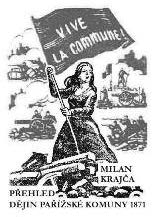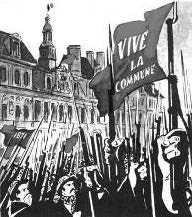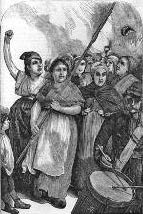Masses Turn Bosses’ Deadly War into Fight for Working-Class State Power
The Paris Commune, one of the most influential events in human history, arose from the Franco-Prussian War (1870-71). It marked the arrival of the working class on the world stage as the most revolutionary class in history. It opened the era of working class world revolution, laying the basis for the Russian and Chinese Revolutions.
The Paris Commune was the first time in history that the workers took power and used it to organize and run society in their own interest. Most important, their legacy teaches us that we must fight for communism, and nothing less.
The lessons of the Paris Commune are fundamental to the strategy of the International Communist Workers’ Party: mobilizing the masses to build a classless world – without money, wage slavery, racism, sexism, xenophobia and imperialist wars. A communist world where the masses plan, produce and distribute everything to meet their collective needs.
War creates material basis for revolution
In the Franco-Prussian war, the Prussian rulers fought to forge a unified German nation at the expense of some French territory. The French capitalists were fighting to stop this and to maintain their hegemony over continental Europe.
This brutal war raged for about a year, with tens of thousands of casualties on both sides. The French army was decisively defeated. The French Emperor Napoleon III was taken prisoner by the Germans, and the German army besieged Paris.
The masses in Paris were mobilized. They sensed the danger and opportunity of the situation. They rejoiced at the fall of the hated Emperor, who had made their lives even more miserable by reorganizing Paris for the rich. Masses had been expelled from their dwellings so the rulers could build wide boulevards. They hoped these would prevent the masses from constructing barricades as they had done in the insurrection of 1848.
In 1792, the rising French capitalists had overthrown the French nobility and declared a Republic. Now in 1871 the French capitalists declared a new Republic. They hoped it would confuse the masses and win them to support their bosses in a patriotic fervor.
A small communist movement that arose during the French Revolution was quickly smashed. But 1871 was not 1792. The working-class movement had matured tremendously. The Communist Manifesto (1848) had shown the way forward. Marx’s International Workingmen’s Association had members in Paris. They rose to the occasion, advocating arming the masses. And the masses went further: they fought to build the Commune.
Daring to Storm Heaven
The Parisian National Guard consisted of soldiers and workers, including some communists. They mobilized armed masses to defend Paris against the Prussian siege — and against the French government.
The French bourgeois rulers were holed up in the Versailles palace, outside Paris. They sent troops to take the cannons of the National Guard, which were key for the defense of Paris. The masses of workers and National Guard soldiers loyal to them fought off a secret early-morning attack. They called on the government’s soldiers to refuse to fight for the capitalists.
A woman confronted the soldiers: “Are you going to fire on us? On your brothers? On our husbands? On our children?” A noncommissioned officer left the ranks, faced his company and called out: “Turn your guns around and put your rifle butts in the air!” The soldiers obeyed.
After a fierce battle, the masses forced the capitalists’ troops and their entire state apparatus to leave Paris and retreat to Versailles. The masses had won the day!
Workers and Soldiers Take and Organize State Power
The Central Committee of the National Guard set up elections for the Commune. Each district elected representatives. Most were workers with little experience in politics but complete commitment to the Commune.
They organized the Commune Council and quickly mobilized the workers to re-establish all public services without bosses, administrators or supervisors. They collectively distributed food and coal to those who needed them at no cost.
“During the Commune’s short reign not a single man woman child or old person was hungry, cold or homeless. It was amazing to see how…this government fought a horrible war for two months but chased famine from the hearths of the huge population which had no work for a year.”
The masses helped make and carry out all the decisions through the Commune Council, section meetings and massive club meetings in the districts. Everyone was encouraged to participate. They changed all aspects of life—from production, to education to social relations to eliminating rent. The next article will describe more of their many achievements and also some shortcomings.
Let’s commemorate the Paris Commune this May Day by marching for communist workers’ power!



Front page of this issue

